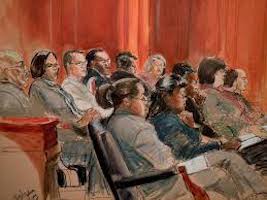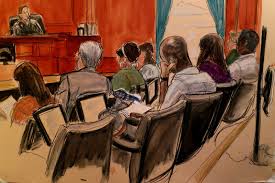I have been following the talc trials against Johnson & Johnson regarding the claims that their powder product gives women ovarian cancer and lung cancer. I hope you have been, too. They are, obviously, very interesting. I can’t look at the Johnson & Johnson powder of bottle sitting on the vanity of the locker room where I work out without thinking about the cases and the many women who have died of these cancers allegedly from years and years of use of Johnson & Johnson powder. The most recent trial in California was just recently declared a mistrial by the trial judge, Judge Margaret Oldendorf. The case is Weirick v. Brenntag North America, BC656425, California Superior Court for Los Angeles County (Pasadena). It involved a claim that use of Johnson & Johnson powder had caused the plaintiff’s mesothelioma, a specific type of lung cancer. The Plaintiff, Weirick, 59, is a school counselor who said she’s been using J&J’s talc products, such as baby powder and the company’s former Shower-to-Shower line, for more than 40 years. She was diagnosed with mesothelioma in 2017 and said her only exposure to asbestos came from use of talc products. Previous juries had come out with verdicts of $25.75 million and $117 million for the plaintiffs, a defense verdict and two mistrials.
This latest trial in California was particularly interesting due to the alleged misconduct of one juror, now scandalously known as “Juror No. 7.” (By the way, if you are ever on a jury and in the course of the trial become known by your Number, it is never a good thing). Juror No. 7, apparently, refused to deliberate with the other 11 jurors, to the point that the foreman asked the judge to replace the juror with an alternate. The defense objected and asked for a mistrial. The plaintiff’s counsel agreed to the substitution. This is interesting because it was never disclosed what side Juror No. 7 was holding out for; Juror No. 7 could have been a juror favorable for the defense and yet defense counsel objected and moved for a mistrial. In fact, it was never disclosed which side the entire jury was leaning in favor of, only that at the time a mistrial was called by the trial judge, the vote was 8-4. At that time, neither side knew which side had the 8 jurors. Since then, it has come to light that the 8 jurors favored the Plaintiff. George Chen, a 30-year old computer analyst and one of the eight who favored a plaintiff verdict, said he was “a little frustrated” and “really wanted to push this through.” He said the four members who voted for the defense seemed to have ”the mindset of … business people” concerning what a responsible company should do.
Even if there were mere traces of asbestos, J&J should have provided warnings, Chen said, because “people have a right to know.” Moreover, he noted, J&J for decades has offered a baby powder made with corn starch, and could have retired the talc version to eliminate any risk.
Another juror who declined to give her name but indicated that she voted with the majority said she, too, was ”pretty frustrated because it seemed pretty obvious to me.” The four others, she said, seemed to think it was ”reasonable” for J&J ”to go for profits over people because that’s what all big corporations do.”
But Amy Avila, 42, one of the jurors who sided with the defense, described the split as between ”the thinkers against the feelers,” and said she wasn’t persuaded that Weirick’s cancer stemmed from exposure to contaminated powder.
In 30 years, I have only had one case declared a mistrial, and it may have been one of the most painful things I have ever experienced as a trial lawyer. It was certainly painful for my clients. In that case, a medical malpractice trial against one of the largest hospitals in Atlanta, the jury deliberated for 3 days. I had no idea which side the jury was favoring, but I objected to the court’s declaring a mistrial. After two weeks of trial and thousands and thousands of dollars lost in expenses bringing the case, ceding to a mistrial is almost the last thing you want to do as a plaintiff’s attorney (although it arguably still beats losing). The trial judge in that case, a very experienced jurist with years and years on the bench, who both sides respected immensely, finally declared a mistrial. And honestly, that trial judge was certainly within his authority to call it at that time. I just hated it. We had to try that case a second time, which is also a horrible experience for everyone involved. My co-counsel in the second trial, Adam Malone, had this apt analogy to retrying a case: “It’s like working out and really sweating so that your clothes are wringing wet with sweat, then taking a shower and having to put your sweaty workout clothes back on.” Yuck. Not fun.
The California judge, by all accounts, did everything the law allowed her to try to get a verdict out of this jury. She used a lot of tools to avoid a mistrial: She interviewed jurors, reiterated jury instructions, ordered more oral arguments and replaced Juror No. 7 with an alternate. Each time defense counsel objected. Did they know something no one in the courtroom knew about this jury? In Georgia, a trial judge has wide latitude in whether to declare a mistrial, whether the mistrial is necessitated by juror misconduct or simply the jury’s inability to reach a unanimous verdict. Generally, whether misconduct by a juror is so prejudicial as to require removal and a mistrial is in the discretion of the trial court. Cooke v. State, 230 Ga.App. 326, 327, 496 S.E.2d 337 (1998); Perez v. State, 266 Ga. App. 82, 84, 596 S.E.2d 191, 193 (2004). Keep in mind that there may be varying considerations about the effect of a mistrial depending on whether the case is civil or criminal. In some criminal cases, the circumstances that necessitate a mistrial may result in the Constitutional inability to retry a defendant if double jeopardy has attached. But in a civil case, the trial judge’s decision to declare a mistrial will not be overturned by an appellate court absent manifest abuse of discretion by the trial judge. Generally, whether misconduct by a juror is so prejudicial as to require removal and a mistrial is also in the sound discretion of the trial court. Cooke v. State, 230 Ga.App. 326, 327, 496 S.E.2d 337 (1998); Perez v. State, 266 Ga. App. 82, 84, 596 S.E.2d 191, 193 (2004). There have been 39 appellate opinions in Georgia state and Georgia Federal courts involving the removal of a juror and only 2 of those were civil cases. This means this issue simply doesn’t occur very often and is rarely appealed. In the California case, besides the alleged juror misconduct of failure to deliberate with the group, it was reported (and I am not sure how anyone knew) that two jurors spoke to each other in the jury room in a language that was not English (in this instance, Mandarin). Defense counsel said this alone was reason enough for a mistrial. Two jurors shouldn’t be allowed to communicate separately with just each other instead of the entire jury. That seems to be sound policy, as the court’s instructions to the jury always include the admonishment to deliberate only when all 12 are present.
So what’s next for these parties? J&J spokeswoman Kim Montagnino said the company would seek a retrial. “We look forward to a new trial to present our defense – which rests on decades of independent, scientific testing confirming that J&J Baby Powder and Shower to Shower do not contain asbestos,” Montagnino said. “Johnson & Johnson stands by our talc products, which have been on the market and used safely for more than 130 years.” There is always the possibility of settlement of this particular claim before a second trial occurs. But two other trials involving J&J’s talc products are currently in progress, one Los Angeles County, and the other in J&J’s home state of New Jersey, which seems not to portend well for a settlement in the California mistrial case. Both sides can learn from the mistried case, although it is an expensive lesson. Conventional wisdom says the person with the burden of proof (here, the plaintiff) stands to do better the second time around because the plaintiff will fix whatever they did wrong the first time, and had already convinced two-thirds of the jury the first time. I’m not sure I agree with that “conventional wisdom.” There will be 12 completely new jurors and 12 completely new opinions. Conventional wisdom may not apply.
Time will tell.
Robin Frazer Clark is a trial lawyer who pursues justice for those who have personal injury claims as a result of being injured in motor vehicle wrecks, trucking wrecks, defective products, defective maintenance of roads, premises safety, medical malpractice and other incidents caused by the negligence of others. Ms. Clark is the 50th President of the State Bar of Georgia, a Past President of Georgia Trial Lawyers Association, a Past President of the Lawyers Club of Atlanta and has practiced law in Georgia for 30 years. She is a member of the International Society of Barristers and of the American Board of Trial Advocates. Mrs. Clark is listed as one of the Top 50 Women Trial Lawyers in Georgia and is a Georgia Super Lawyer.
Robin Frazer Clark ~ Dedicated to the Constitution’s Promise of Justice for All.
 Atlanta Injury Lawyer Blog
Atlanta Injury Lawyer Blog














